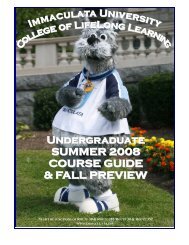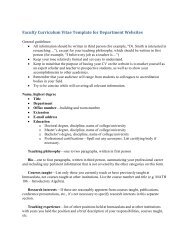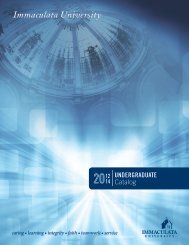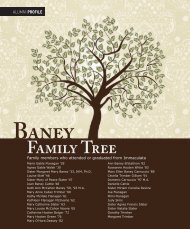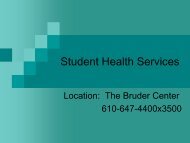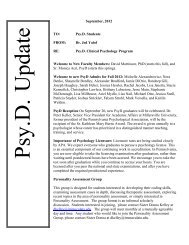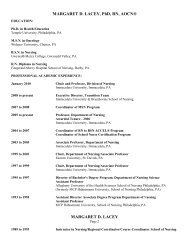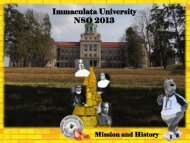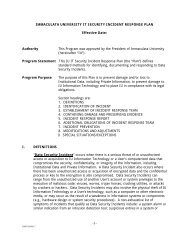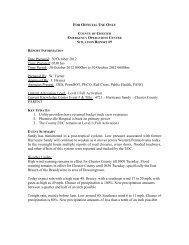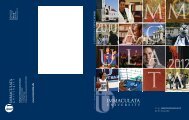8529 Cat.qxd - Immaculata University
8529 Cat.qxd - Immaculata University
8529 Cat.qxd - Immaculata University
You also want an ePaper? Increase the reach of your titles
YUMPU automatically turns print PDFs into web optimized ePapers that Google loves.
objectives: 1) to provide basic understanding of the scientificprinciples underlying conservation and environmental science, 2) toexplore current environmental topics and 3) to begin developing apersonal set environmental values. Emphasis is placed on a holisticapproach using laboratory exercises, environmental surveys, andclass discussions to reinforce scientific principles. This course isappropriate for students with little or no scientific background.(Fulfills core requirement. Does not count toward a science major’srequirement) 2 hours lecture, 2 hours laboratory. Note: 191 orpermission of instructor is prerequisite for 192206. Microbiology for Food Science (3)A study of microorganisms and their relation to food, sanitation,health, and industry. 3 hours lecture207. Human Biology (3)A study of the human organism with emphasis on development.structure, and function. 3 hours lecture.208. Microbiology for Health Science (4)An exploration of the structure and function of microorganismsas they relate to the economy of nature; the role of pathogens inhuman disease; and methods of prevention of contamination. 3hours lecture, 2 hours laboratory.209-210. Human Anatomy and Physiology I, II (4, 4)A study of the underlying process, at the cell, organ, and systemlevels of organization, which are the backbone of our modernunderstanding of the functioning human body. 3 hours lecture, 2hours laboratory.Note: 209 or permission of instructor is prerequisite for 210233. Cell Biology (4)A study of basic cellular and biochemical processes to provide afoundation for advanced work in biology. Pre- or Co- requisites:CHE103, MATH207 or 301; or permission of instructor. 3 hourslecture, 3 hours laboratory.234. Genetics (4)Fundamental Mendelian principles of heredity as well as anintroduction to molecular genetics. Topics include: Mono-dihybridcrosses, sex linkage, co-dominance, linkage and genetic mapping,and an introduction to DNA Replication, transcription andtranslation. Laboratory will focus on inheritance in fruit flies andmutational analysis in yeast. Prerequisites: BIOL233, CHE103, orpermission of instructor. 3 hours lecture, 3 hours laboratory.235. Biomechanics (3)A study of the structural and functional adaptations of livingorganisms related to the physical constraints on body support andmovement. Topics include walking, running, jumping, leaping,climbing, swimming, and flying. Prerequisites: BIOL209-210 orBIOL233-BIOL306, or permission of the instructor. 3 hours lecture.291-292. Special Problem (1-3, 1-3)Student-oriented laboratory, field, and/or literature studies.Admission to the courses by application to the biology staff.305. Evolution and Diversity (4)A comparative survey of the structure and function ofrepresentative organisms in a number of different kingdoms, phyla,and classes paying particular attention to their evolution andadaptations. Prerequisites: BIOL234; or permission of instructor. 3hours lecture, 3 hours laboratory.306. Mammalian Structure and Function (4)An investigation of the anatomy and physiology of majormammalian systems with an emphasis on the human organism.Prerequisites: BIOL233, CHE103; or permission of instructor. 3hours lecture, 3 hours laboratory.307. Ecology (4)Examines the interactions among different species and theirenvironments at the individual, population, community, ecosystem,and biome levels. Prerequisites: BIOL234; or permission ofinstructor. 3 hours lecture, 3 hours field/laboratory.308. Botany (1)An introduction to the structure, growth, development, andresponses of the flowering plants. Prerequisite: BIOL 233,CHE103; or permission of instructor. 1 hour on-line self-study.310. Developmental Biology (4)A course on the classical and molecular analysis of embryonicdevelopment. A comparative approach is employed to demonstratesignificant patterns in embryology. Although vertebratedevelopment is emphasized, other organisms will be explored astime permits. Prerequisite: BIOL234, CHE104, MATH208 or 302;or permission of instructor. 3 hours of lecture, 3 hours laboratory.320. Junior Seminar (1)This course introduces students to formal scientific thinking andwriting. It includes instruction in scientific writing, use ofcontemporary scientific literature, and library research techniques.Students will write and orally present a formal research proposalthat will include the formulation of a hypothesis supported by acomprehensive literature review and the development of anexperimental protocol. Prerequisites: biology 233-234 and juniorstatus; or, permission of the department. (1 hour lecture)323. Microbiology (4)Introduction to the microbial world with detailed study ofbacteria: classification, morphology, physiology, and genetics, withconsideration of industrial and environmental effects. Laboratorystresses aseptic handling and recognition of microorganisms,identification of unknown bacteria, and independent investigation.Prerequisite: BIOL234, CHE104; or permission of instructor. 3hours lecture, 3 hours laboratory.335. Principles of Physiology (4)A biophysical approach to the functioning of selected bodysystems related to movement, information processing, sensorydiscrimination, regulation, and control. Prerequisites: BIOL233,CHE104, PHY204 (may be or taken concurrently); or permission ofinstructor. 3 hours lecture, 3 hours laboratory. (See PHY 335)366. Molecular Biology (4)The structure and function of the gene at the molecular level inprokaryotes and eukaryotes. Study will focus on gene function,transcription in prokaryotes, operons, transcription regulation ineukaryotes, posttranscriptional events, translation, and theenzymology of DNA replication. Laboratory will focus onmolecular cloning methods as well as tools for studying genes andgene activity. Prerequisites: BIOL234, MATH208 or 302; orpermission of the instructor. 3 hours lecture, 3 hours laboratory39



